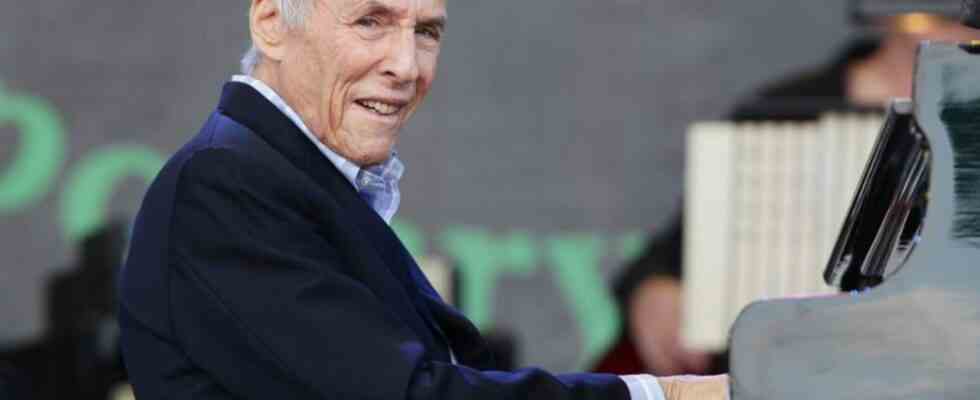Taking leave
“King of Easy Listening”: composer Burt Bacharach is dead
Burt Bacharach on the Pyramid stage at the Glastonbury Festival at Worthy Farm in Somerset (2015). The American composer and Oscar winner has died at the age of 94. photo
© Yui Mok/PA Wire/dpa
With a flair for deep yet easy-going pop, Burt Bacharach found the formula for 1960s music. His “Light Music” will remain even after his death.
“Hey man,” Miles Davis once told Burt Bacharach, “‘Alfie’ is a very good song.” For the composer Bacharach, who placed more than 70 titles in the top 40 of the charts and was one of the most successful composers of our time, this was a kind of accolade. When Miles Davis, one of the best jazz musicians ever, says something like that, “perhaps everything is fine in the world”.
In gentle, charming songs, Bacharach described life from its bittersweet side. He died on Wednesday at the age of 94, as his spokeswoman Tina Brausam told the German Press Agency on Thursday. She cited “natural causes” as the cause of death.
Despite hitting the charts dozens of times, Bacharach was not a fast-producing hit machine. “You don’t get something done every day,” he told the Daily Beast website in 2013. “But it’s important to visit your construction site every day to at least improvise, touch the piano, play some chords.” You have to be “in touch” with your own music, so you have to feel a connection to it.
From Dionne Warwick to Beyoncé
Often dubbed the King of Easy Listening, Bacharach could be judged by a slew of Grammy wins, but his influence extended beyond his own trophy case. His handwriting can be found in dozens of pop and alternative titles or in musicals on Broadway. His likeness even made it onto the cover of Britpop band Oasis’ album “Definitely Maybe.” Probably thanks to this reach, he was the favorite composer of beach boy Brian Wilson, and Frank Zappa was enthusiastic about the elegance that he brought to the charts in the 1960s. Composers such as George Gershwin and Irving Berlin were mentioned in the same breath, and he accompanied the German icon Marlene Dietrich for several years.
In the 1960s it was above all the interaction with singer Dionne Warwick that turned out to be a gold mine for Bacharach. Between 1962 and 1968 alone, the two lifted 15 titles into the top 40 of the US charts, including “Anyone Who Had a Heart”, “Reach Out for Me”, “Message to Michael”, “You’ll Never Get to Heaven” and “What the World Needs Now is Love”. Aretha Franklin and Isaac Hayes later refined their run-throughs “I Say a Little Prayer” and “Walk On By”, respectively, whose 12-minute soul masterpiece even made it as a sample on Beyoncé’s album “Lemonade”.
Born in Kansas City, Missouri, Bacharach found early influences in bebop and jazz, which he heard his role models Dizzy Gillespie and Charlie Parker play in New York. But Bacharach also wove Brazilian bossa nova and traditional pop into his titles. Composer partner Hal David contributed to most of his most memorable pieces.
Awarded for film music
And as if the two didn’t have enough on their plate, in the 1960s they wrote soundtracks for “What’s New, Pussy?”, “The Seducer Sends His Greetings” and “Casino Royale” or the story about Butch Cassidy (Paul Newman) and the Sundance Kid (Robert Redford) in the western comedy “The Bandits” (1969). Musically, Bacharach’s cuddly title “Rain Drops Keep Falling on My Head” stuck with the screen classic. Bacharach won three Oscars and two Golden Globes, and he was also nominated several times for both awards.
The flight of fancy came to an end for the time being when composer David, singer Warwick and his now second wife left Bacharach. It was to take around ten years before he climbed back onto his old musical plateau. “Music was my essential love all the way through,” he told the Guardian in 2015. He had learned to play the cello, drums and piano as a child and later studied music and composition. By 1986, Bacharach had returned to his former glory, scoring two number one hits in the same year.
In old age, Bacharach, who had been married four times, came to Germany for the first time for a concert. In July 2018 he performed in Berlin, two months after his 90th birthday. About 1,500 supporters came to the Admiralspalast and saw a 90-year-old man wearing sneakers with his jacket, playing the piano for hours, telling anecdotes in between and looking fitter than many 60-year-olds. Bacharach said at the time that he was happy to still be able to travel the world at his age and make music with his own son.

